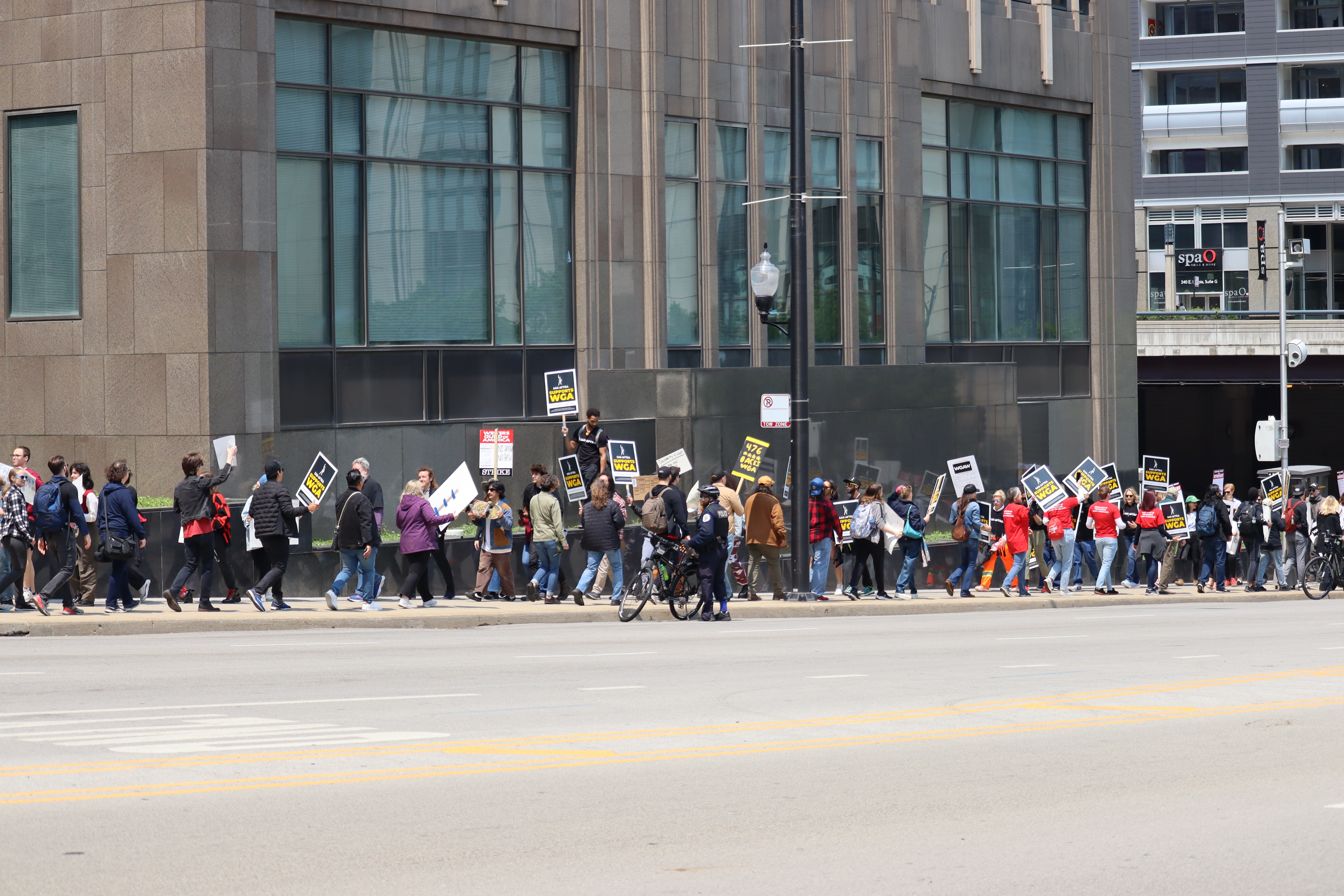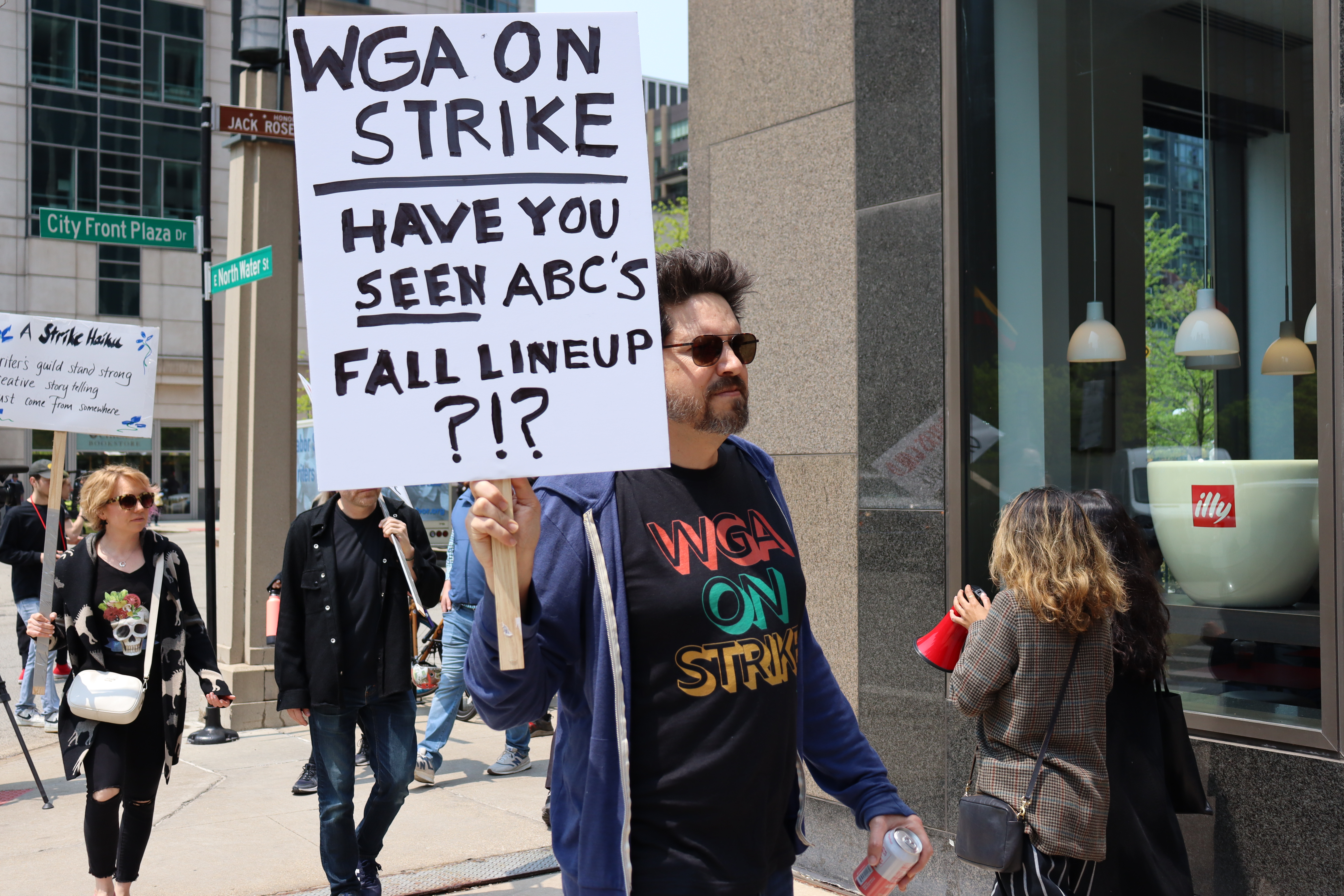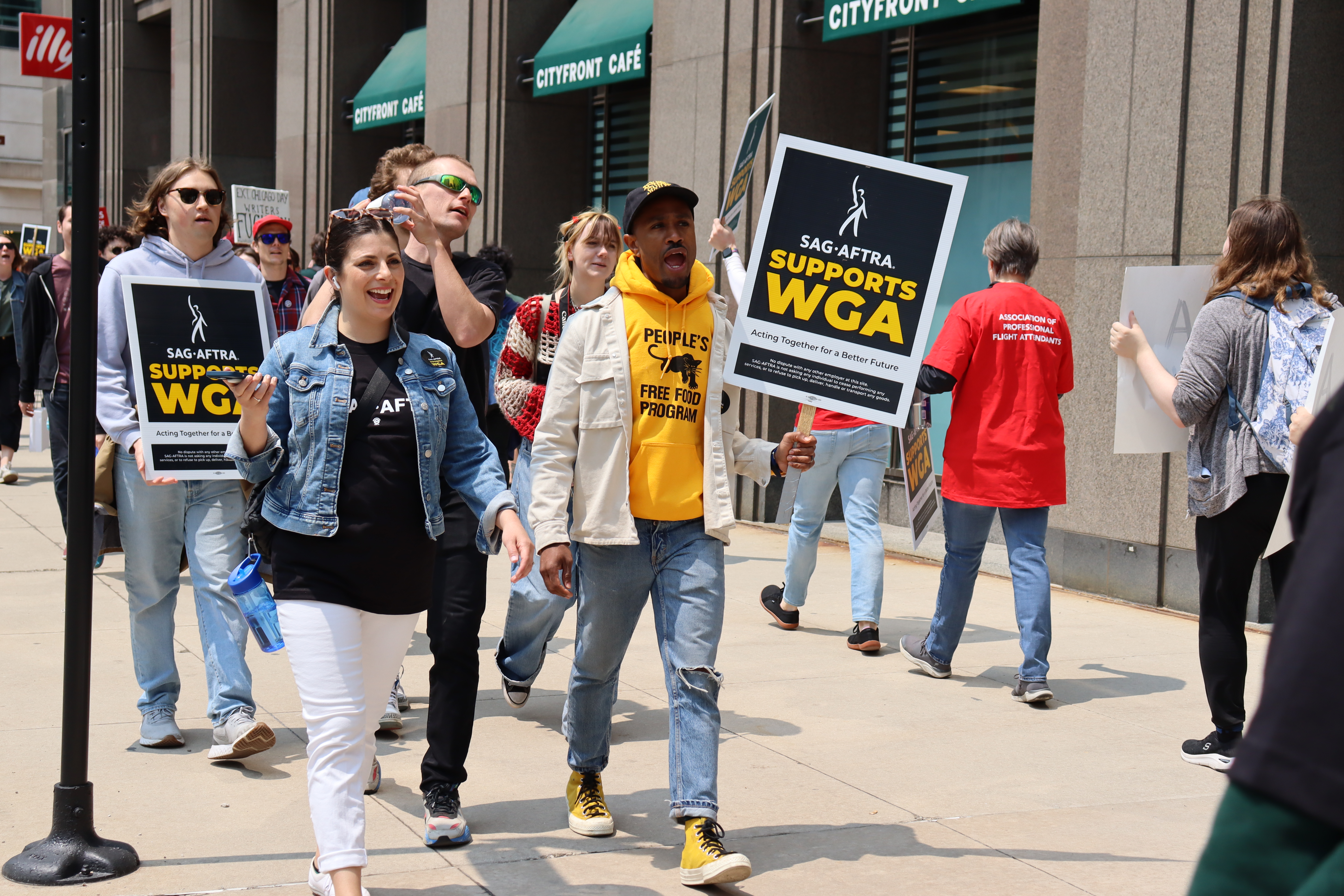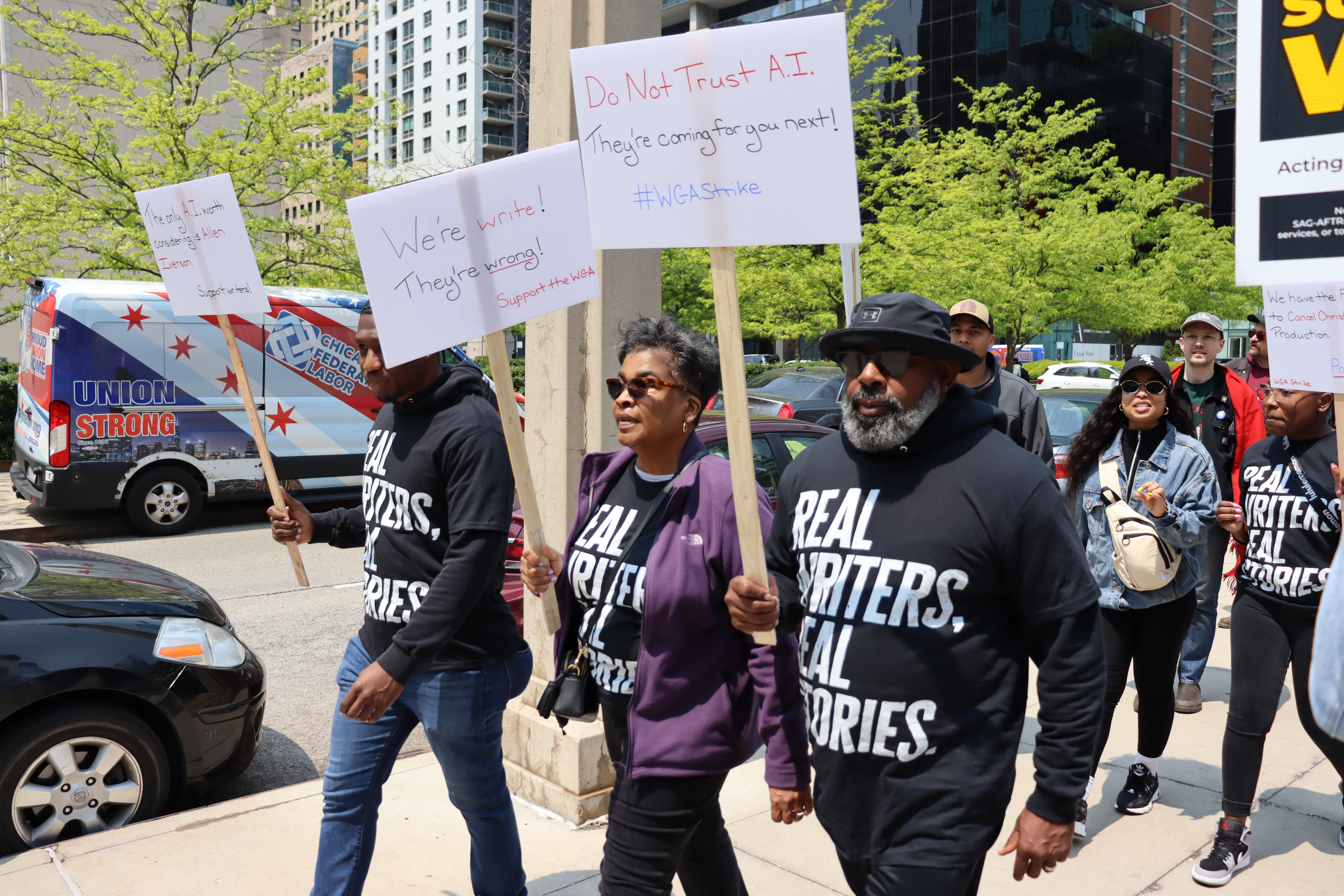WGA and other local unions picket outside NBC
On Wednesday, May 17, chants filled the air around the NBC Tower as hundreds came out to mark the Writers Guild of America (WGA) strike. WGA members and members of other local unions picketed outside of the company behind many local television shows like “Chicago Fire,” “Chicago PD” and “Chicago Med.”
Members of the WGA, the union representing film, television and radio writers across the country, went on strike on May 2 after a contract deal could not be met with the Alliance of Motion Picture and Television Producers (AMPTP). Michael Gilio, a strike captain for WGA West in Chicago, said that some of the main things the WGA is fighting for are “fair wages, standing up against AI [and] residuals.”

WGA strikers and union supporters protest in front of the NBC Tower on May 17. Photo by Michelle Edwards, 14 East
As streaming has grown in the entertainment industry, the WGA has raised concerns that streaming does not often offer the same residual payments that writers would receive from cable. Residuals typically provide monetary compensation to people who worked on shows or movies when they air in reruns, but streaming services often don’t treat streaming like reruns, which has led to a lowering of writers’ salaries. There have also been fears that studios could try to use artificial intelligence to write or edit scripts instead of union labor. Some Chicago WGA members’ picket signs referenced these issues.
Members of other entertainment unions are also concerned about similar issues and came out to support at the picket line in Chicago. Bill Combs was one of them. He is a member of the national board of the American Guild of Musical Artists and a member of the Chicago Entertainment Industry Labor Council.
“Nobody wants to deny the effect of new technology, but we do need to talk about its effect on human beings and the artists who make this industry so great,” said Combs. “I think especially with the WGA right now standing up for something which is going to affect everyone in the arts and entertainment industries, as that AI technology continues to grow, I think it’s so important to make a stand now and set up a good foundation moving forward.”
TJ Cimfel is a feature writer and one of the WGA East members on strike in Chicago. He also feels the urgency in striking now.
“It is impossible for writers today to make a living in this business now because of the greed of the corporations, the studios and the streamers. And if we want the Guild to still exist in the next several years, we’ve got to take a stand,” said Cimfel.

TJ Cimfel, one of the WGA East members in Chicago, pickets alongside his union. Photo by Michelle Edwards, 14 East
Last year the state of Illinois brought in almost $700 million from the film and television industry, and union members think this should be considered during WGA contract negotiations.
“The fact that these guys are creating an industry, bringing in money into our city, I think needs to be rewarded, needs to be acknowledged. They’re fighting for their wages, for their working conditions, and I think we as a community in Chicago and in the suburbs should stand with them and support them in what they do,” said Raza Siddiqui, the president of NABET Local 41, the union representing television photographers.
Jereme Green is a member of IATSE Local 476, the union representing stagehands. He pointed out the dedication of entertainment unions like the WGA and IATSE throughout the pandemic.
“Chicago actually classified us as essential workers to get back to work soon right after Covid hit to start producing and creating TV shows and movies because they see the big check that came from it. So, that actually helped boost the economy of Chicago back up after the Covid shutdown,” said Green.
Other entertainment unions also showed support for the WGA in Chicago. One that came out in large numbers was SAG-AFTRA, the union representing actors, announcers, broadcast journalists and others. Charles Andrew Gardner is the president of the local SAG-AFTRA in Chicago and is also an adjunct professor at DePaul teaching on-camera acting. He says that the union came to picket because of the importance of solidarity.
“We’re one industry, we’re one organization, even though we represent different sections of the organization, of the industry. If we don’t stand in solidarity, then it’s easier for all of us to fall apart,” said Gardner.

Charles Andrew Gardner, president of the local SAG-AFTRA and adjunct professor at DePaul, joins in the protest around the Cityfront Plaza to show solidarity for the WGA. Photo by Michelle Edwards, 14 East
Members of other film and television unions also recognized the universal nature of their labor disputes.
“Just a year or two ago, IATSE was close to calling a strike for a lot of the similar reasons, so we stand with the writers, and we want to show our support,” said IATSE member and special effects technician Allison Cayo.
According to WGA West strike captain Gilio, IATSE also worked in solidarity to help shut down a show trying to film in Chicago while the WGA is on strike.
“We shut down the show ‘The Chi’ just the other day, we couldn’t have done it without the Teamsters and IATSE. If it wasn’t for them not crossing the picket lines, it would’ve just been a handful of people standing outside a Cinespace gate, but with them, they shut it down,” said Gilio.
Gilio says that this sort of collective action shows companies that the unions are standing together, and it has a financial impact, which can help bring companies to the bargaining table.
The importance of union solidarity was something many members talked about while picketing outside NBC. As they marched, people chanted “Get up, get down, Chicago is a union town.”
Chicago has historically been a labor town and supporters of the WGA picket wanted to remind corporations of that.
“It’s important for the world and the country to know that organized labor is still here, we’re alive and well, and we plan on being here for a long time to come,” said Marty Durkan, a member of the International Union of Operating Engineers Local 150.

WGA strike supporters walk around the Cityfront Plaza, on May 17. Photo by Michelle Edwards, 14 East
The picket saw support from unions across the city, including from outside the entertainment industry, like the American Federation of State, County and Municipal Employees, the Association of Professional Flight Attendants, the Chicago Teachers Union, LIUNA and others.
Nora Cay Ryan, the chief of staff at the Chicago Federation of Labor, talked about the importance of unions supporting the WGA.
“It doesn’t matter who has a dispute, every dispute affects every worker. So, it’s about getting everybody out here and showing management of any kind, that here in Chicago we won’t stand for it,” said Ryan.
Jeff Hillery, a member of the Sheet Metal Workers’ Local 73 union, said he is “very hopeful” that the support and solidarity for unions in the city will continue to grow beyond the WGA strike, especially since a former CTU organizer, Brandon Johnson, is now mayor.
“Brandon Johnson carries a union card, so he is all for the support of any type of union activities, that makes everything stronger, so it helps out the working people, the families and stuff like that,” said Hillery.
During the NBC picket, Mayor Johnson tweeted out support of the WGA workers striking in Chicago.
Chicago is a proud union town. I stand in solidarity with @WGAWest & @WGAEast for their demands for fair pay & proper working conditions. We must stand behind our creatives who continue to enrich our lives through their art & support each other in times of need.
— Mayor Brandon Johnson (@ChicagosMayor) May 17, 2023
As the strike stretches to four weeks, the WGA continues to fight for their contracts. SAG-AFTRA’s contract with the AMPTP is coming up June 30, and their members are currently voting on whether to authorize a strike. Local SAG-AFTRA president Gardner says that these current labor disputes are important for the future of the industry.
“If we plant the seeds today, when you all graduate in the future, it’s going to be a thriving industry,” said Gardner.
Header illustration by Yù Yù Zander




David Eigenberg, Nick Gehlfuss Reunite on SAG Strike Picket Line: Chicago Fire, Med -
24 July
[…] Might 17, 2023, 14 East Magazine reported that WGA members behind Chicago Fireplace, Chicago P.D. and Chicago Med picketed […]